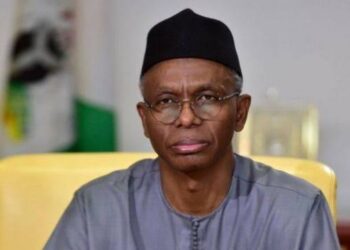Following reported violence that marred the Bayelsa and Kogi governorship elections, the Independent National Electoral Commission (INEC), wants a review of security arrangements for future elections. Emeka Nze writes
Violence everywhere in Bayelsa, Kogi
The Kogi and Bayelsa states’ governorship elections as well as the Kogi West senatorial re-run on Saturday, November 30 were characterised by violence, shootings, killings, vote-buying and ballot box snatching. Confirmed reports said many polling units across the two states experienced tension created by political thugs.
Though there were cases of pre-election violence, thuggery and threat to lives and property and generally obvious security alarms ahead of the elections in both states, when the election proper took place cases of violence and thuggery were at scale far beyond expectation.
In Kogi state for example, at least four persons were confirmed killed during the election by political thugs while unconfirmed report said no fewer than 22 persons were allegedly killed and many others injured in Bayelsa state as peace took flight mainly due to electoral violence.
Though the Commissioner of Police in Kogi state, Hakeem Busari, had before the elections assured residents of the state of the safety of their lives and property as much as 35, 000 police personnel were drafted to the state for the exercise. It seems though that these proved to be inadequate as thugs and other miscreants took control of the state.
For instance, eyewitness said the two persons were killed when voters resisted the thugs. Unfortunately, the thugs killed the two persons while a passerby sustained a life-threatening injury from gunshot wound. This angered the youth who mobilised and set the house of a chieftain of one the political parties in the area ablaze.
Thugs kill two youths in Dekina
There were also reports that two people identified as Umoru Shuaib and Faruk Suleiman were feared killed in Abocho community in Dekina council area. The duo were allegedly attacked by men in police uniform while voting was going on at the Barrack Polling Unit 01.
According to the source, “Some unsuspecting able-bodied men on a bus who dressed as policemen came to the polling unit while voting was going on. The bus went too close to two young men who were discussing while the occupants of the vehicle suddenly shot them and left.”
Also said there were sporadic shootings in Emewe Okapada, Ajiyolo communities as well as the Egume Police Station Polling Unit in Dekina and many other parts of the state. Reports said some masked armed men had stormed a polling unit in Aikpele-Ajaka Polling Unit 002, shot sporadically into the air and disrupted voting while INEC officials and voters fled.
Same situation was replicated in many polling units as the thugs and men dressed in military and police uniforms took advantage of the scampering electorate to snatch ballot boxes as well as abduct of INEC officials in Lokoja Club House, Ajayi Crowther Memorial College, Ward 07 in Lokoja, Locogona, Barrack area, Takete, Feyintolu, Mopa-Moro council area and in SUBEB area.
INEC yearns for reforms
Irked by lingering electoral violence that has tended to rubbish its efforts to conduct transparent and violet-free elections, the INEC, especially following the November 30 elections in Bayelsa and Kogi states, has used every opportunity to demand reforms in the Electoral Act. The commission is especially concern about reforms in security system that would enhance violence-free elections.
At a recent the meeting of the Inter-Agency Consultative Committee on Election Security (ICCES) in Abuja, the commission said henceforth there will be comprehensive information on security operatives and clear details of their postings and names to ensure that they are held accountable for their actions.
The INEC chairman, Prof Mahmood Yakubu, disclosed this at the meeting of the Inter-Agency Consultative Committee on Election Security (ICCES) in Abuja.
According to the INEC boss the meeting “will review the efficacy of security deployment in relation to field experience on election day, in order to determine what we got right and what we did not”.
INEC foresaw flashpoints
In his words, “ahead of the Bayelsa and Kogi governorship elections, the commission’s appraisal of the security situation using our Election Violence Mitigation and Advocacy Tool (EVMAT) identified some flash points. At the last meeting of ICCES, we shared our assessment with the security agencies. We also had several stakeholders’ meetings in Yenagoa and Lokoja involving the security agencies. At these meetings, stakeholders across the board expressed concern about the possibility of violence.
“The security agencies made their own assessment based on which they arrived at the numbers of personnel to be deployed as well as other operational details in order to secure the process. At this meeting, we shall review the efficacy of security deployment in relation to field experience on Election Day, in order to determine what we got right and what we did not.
Clear identity for security agents during polls
The commission believes that the purpose of security deployment during elections is to protect the voters, election officials and materials, accredited observers, the media and to safeguard the integrity of the processes generally, including the polling units and collation centres.
“Therefore, the deployment of security personnel in all future elections should be tied to specific locations and activities. All security personnel deployed to polling units and collation centres should be identified by name as is the case with INEC officials. This will not only enhance transparency, but the Commission and security agencies will know who to contact in specific locations during elections when the need arises.
“They will also be held responsible for the proper conduct of elections in those locations. The Inspector-General of Police has assured the Commission that this new approach to the deployment of security personnel will be piloted in the court-ordered re-run elections holding next month.
Need to review security framework
“The current electoral security framework provides for deployment of personnel in three concentric circles. In the innermost circle are the polling units where unarmed policemen are deployed while in the outer circles, armed security personnel are deployed to mount roadblocks, patrols and provide rapid response in case of any emergency at the polling units or collation centers.
“We must also review the deployment of armed security to the outer perimeters so that they are readily available to counter the movement of thugs with the intention of disrupting elections through the intimidation of voters; harassment of election officials, observers and the media or snatching of election materials. Arrest of offenders must be followed by a thorough investigation so that thugs and their sponsors are penalised under the law.
We shall suspend subsequent elections….if need be
“I wish to reiterate that while the commission has no power under the law to cancel elections, we will not hesitate to suspend elections anywhere our officials report the disruption of the process or threats to the lives of voters, election officials and observers by acts of thuggery or community connivance.
“The commission will not return to the affected areas for as long as it takes until we are guaranteed adequate safety for all those involved in the process. We must never allow violence and thuggery to define our elections. The commission will submit proposals to the National Assembly on how the electoral legal framework can be amended to sanction violators and further empower the commission in this respect”.
INEC ready for use of technology
The INEC chairman also hinted on the efforts of the commission to achieve technology-based elections.
“Similarly, we need to continue to deepen the use of technology for the integrity of elections. The Senate Committee on INEC has already shared with the commission the Electoral Act amendment bill for our input. We are excited by some of the new provisions concerning electronic transmission of results.
“We are glad that the electoral legal framework is removing some of the encumbrances to the full deployment of technology for the improvement of the electoral process in Nigeria, especially result collation and management.
“The commission will work with the National Assembly for the expeditious passage of the amendment to the electoral legal framework so that work can begin in earnest to make future elections in Nigeria more technology-based. It is long overdue, it is doable, it is achievable and it is inevitable”.



